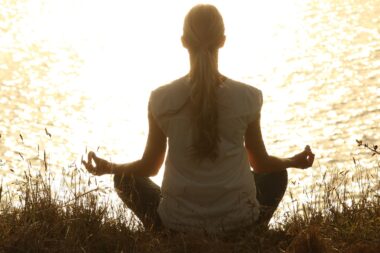Common Mistakes Beginners Make in Yoga and How to Avoid Them
Yoga is a beautiful practice that promotes well-being and balance, but many beginners often make mistakes that can hinder their progress. One common error is rushing into advanced poses without mastering the fundamentals. Beginners may feel pressure from seeing others perform complex postures and attempt to replicate them, leading to frustration and potential injuries. It’s crucial to learn the basic alignment and breathing techniques first, creating a strong foundation. Additionally, not listening to your body is another pitfall. Each person’s body is unique, and what works for someone else may not work for you. Beginners should focus on their own limits and respect them. Practicing self-care through gentle modifications when necessary can prevent injuries and enhance the experience. Furthermore, skipping warm-up stretches can lead to muscle strain. Proper warm-ups prepare the body for movement and enhance flexibility. Finally, a lack of consistency can hinder progress. Yoga is most effective when practiced regularly, so commit to a routine that works for your lifestyle and aims for gradual improvement over time.
Another common mistake beginners make is focusing solely on physical postures, neglecting the mental and spiritual components of yoga. Yoga is not just about achieving a perfect pose; it’s about cultivating mindfulness and connection with oneself. Meditation and breathwork are essential aspects that deepen the practice. Therefore, beginners should incorporate these elements to develop a holistic approach to yoga. A misconception exists that yoga requires a specific body type, often discouraging many from joining classes. Yoga is for everyone, irrespective of shape or ability. There is beauty in diversity, and adapting poses to your body is vital in making yoga inclusive. Beginners should also avoid comparing themselves to others. Each individual’s yoga journey is unique, and celebrating personal progress, no matter how small, is important for building confidence and motivation. It might also be beneficial to explore various styles of yoga to discover what resonates best. Trying different classes can expose beginners to diverse practices while helping them avoid stagnation. Finally, understanding that yoga is a lifelong journey rather than a destination permits growth and encourages perseverance through challenges.
Avoiding the Trap of Self-Judgment
Self-judgment is another common hurdle for beginners. Many people become overly critical of themselves when they don’t achieve the expected results. This negative mindset can create unnecessary pressure and disappointment. To overcome this, it’s vital to practice self-compassion and understand that everyone starts somewhere. It’s perfectly okay to struggle with certain poses or moments of clarity during practice. Embracing imperfections allows beginners to cultivate a more enjoyable experience. Additionally, overextending during practice can lead to injuries. Some newcomers push themselves too hard to keep up with more experienced practitioners. It’s essential to practice safely and know when to step back. Taking breaks and modifying poses are not signs of weakness but rather acts of wisdom. Using props can enhance practice and support mobility for beginners. Bolsters, straps, and blocks make poses more accessible, which boosts confidence and flexibility. Practitioners should also remember to breathe correctly during their sessions. Focusing on breath can help maintain focus, balance poses, and create a state of relaxation. Ultimately, embracing the journey with all its ups and downs leads to a deeper understanding of yoga.
The journey of yoga is filled with opportunities for personal growth; embracing challenges and missteps is essential. It’s critical to approach lessons with an open mind, ready to learn. Beginners should also cultivate community and connectivity within classes. Forming relationships with fellow practitioners can create a supportive environment, fostering encouragement and motivation. Moreover, novices often underestimate the importance of following a qualified instructor’s guidance. Instructors provide necessary feedback on alignment, posture modification, and breathing techniques, which can greatly enhance a student’s practice. Avoiding professional guidance may lead to misalignment and injuries during practice. Practical knowledge can empower beginners to deepen their understanding of yoga philosophy, assisting them in navigating their own practice more effectively. Additionally, it’s beneficial to set achievable goals rather than unrealistic expectations. This practice can help build confidence and promote steady progress without overwhelming frustration. Goals should encompass both short-term and long-term aspirations, such as improving specific poses or creating a consistent routine. Tracking progress through journaling or mindfulness can also inspire a sense of accomplishment as improvements emerge.
Finding Balance in Your Yoga Practice
Balance is an essential aspect of yoga that transcends physical postures. Many beginners assume that attaining perfect physical balance in poses is the goal, but true balance also encompasses mental and emotional stability. Beginners should thus prioritize finding a harmonious approach to their practice that integrates body, mind, and spirit. This holistic view can lead to a more enriching yoga experience. Additionally, practitioners should take time for recovery and rest days. Like any physical activity, consistent yoga practice can lead to fatigue if not handled carefully. Respecting the body’s need for rest can prevent burnout and preserve enthusiasm. Beginners often mistake yoga as purely physical, neglecting the emotional benefits it can offer. Yoga encourages self-discovery and brings awareness to emotions, fostering mental clarity. Beginners should allow themselves to explore and embrace these emotional layers. Taking time to reflect following each session can be enlightening, as journaling or meditating can enhance the mind’s relationship with the body. Learning to surrender in practice is another critical lesson, allowing for a more profound connection to yoga’s peace and calm.
Lastly, incorporating the philosophical teachings of yoga can greatly inform and enrich a beginner’s practice. Many people begin yoga focused only on physical aspects, but delving into the principles of yoga can provide deeper understanding and connection. The Yamas and Niyamas, which highlight ethical standards and personal practices, set the stage for a mindful lifestyle. These guiding philosophies can transform a novice’s approach and enhance their growth inside and outside the studio. Moreover, understanding the importance of gratitude in practice can shift perspectives. Fostering gratitude not only for progress but for every practice can cultivate a positive mindset. Consequently, yoga becomes less about achieving perfection and more about appreciating one’s journey and experiences. Incorporating a discussion of yoga’s history and lineage can also deepen a beginner’s respect for the practice. Understanding where it originated and the different cultural influences involved fosters appreciation. Ultimately, reframing the perspective on yoga awareness can shift focus from external performance to internal growth. This shift allows beginners to approach their yoga journey with patience, openness, and an eagerness to evolve continually.
In conclusion, common mistakes beginners make in yoga can significantly impact their journey if not identified and addressed appropriately. By focusing on building a strong foundation, fostering self-awareness, and embracing the full philosophy of yoga, one can ensure a much more enriching experience. Practitioners should make an effort to remember not only the poses but the breath, the mind, and the heart. Cultivating consistency and approaching practice with respect for oneself can make a difference. Additionally, leveraging both community support and professional guidance can facilitate smooth transitions through challenges. Practicing patience and allowing for gradual progress encourages resilience, self-acceptance, and unearths the immense benefits yoga has to offer. Striving for a balance between physical, mental, and emotional aspects transforms the experience into one of deep significance. With dedication and mindfulness, beginners can navigate common pitfalls effectively and create a fulfilling path that evolves and enriches their lives. After all, yoga is more than a series of movements; it’s a lifelong journey filled with discoveries and learning moments that inspire growth, happiness, and connection to the self.





